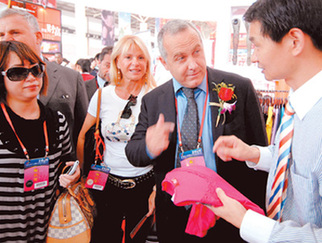Needles, fasteners, even lighters can now be traded through e-commerce as China releases a code standard for small commodities in Yiwu on Tuesday.
It's the first country to have such a code standard which covers 1.7 million varieties of small commodities, said Liu Bisong, a research fellow with the China National Institute of Standardization.
The code, jointly compiled by the Ministry of Commerce, the General Administration of Customs and national standardization research institutes, will be officially put in use as a national standard on Nov. 1, announced the sponsors at the China Yiwu International Commodities Fair.
|

|
|
About 17,000 traders from more than 130 foreign countries and regions took part in this session of the Yiwu fair running through Oct. 25. [Xinhua] |
The code uses 12 digits to categorize commodities, 11 digits for trademark registration and nine digits to identify the place of origin, explained Liu
"In the future, the code will be able store information such as the producer's credit and production capacity," he added.
Standardized coding allows for more effective electronic purchasing management and will assist with marketing, sales and distribution when commodities are traded internationally, said Hu Jianping, an official in charge of market standardization in the Ministry of Commerce.
She said that the code can also help producers protect intellectual property rights and improve quality supervision.
Currently, there are several internationally recognized coding standards, such as the United Nations' Certified Professional Coder, Universal Standards Products and Services Classification (UNSPSC) compiled by the United Nations Development Program and the Harmonized System (HS) standard from the World Customs Organization.
Liu said that China's small commodity coding standard covers a wider range of commodities and is more precise than the above three coding systems.
"It is possible that China's commodity standard will soon become internationally recognized, driven by China's immense export capacity for small commodities," he said.
China first adopted commodity coding for some exported goods in the 1980s.
Research and compilation of the coding standard for small commodities was carried out in Yiwu in 2006, where questionnaires were issued to 13,498 businesses.
Wu Bocheng, president of China Small Commodity City in Yiwu said that the coding standard would help advance Yiwu's market radiating capacity.
About 17,000 traders from more than 130 foreign countries and regions took part in this session of the Yiwu fair running through Oct. 25.
Yiwu, in east China's Zhejiang Province, is 300 km away from the commercial hub of Shanghai. It has the world's largest wholesale market for small commodities.
The fair in Yiwu, held for 14 successive years, has become one of the major foreign trade platforms for both Chinese and foreign enterprises.
(Xinhua News Agency October 22, 2008)